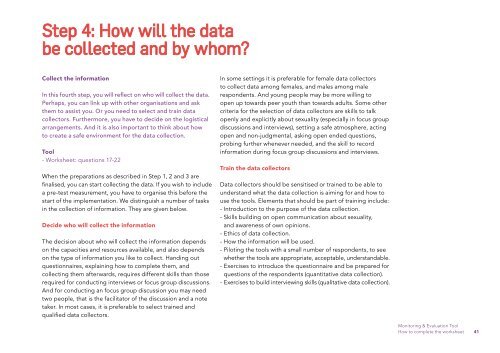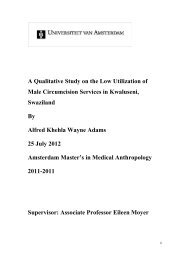ARE YOU ON THE RIGHT TRACK? - Rutgers WPF
ARE YOU ON THE RIGHT TRACK? - Rutgers WPF
ARE YOU ON THE RIGHT TRACK? - Rutgers WPF
- No tags were found...
Create successful ePaper yourself
Turn your PDF publications into a flip-book with our unique Google optimized e-Paper software.
Step 4: How will the databe collected and by whom?Collect the informationIn this fourth step, you will reflect on who will collect the data.Perhaps, you can link up with other organisations and askthem to assist you. Or you need to select and train datacollectors. Furthermore, you have to decide on the logisticalarrangements. And it is also important to think about howto create a safe environment for the data collection.Tool- Worksheet: questions 17-22When the preparations as described in Step 1, 2 and 3 arefinalised, you can start collecting the data. If you wish to includea pre-test measurement, you have to organise this before thestart of the implementation. We distinguish a number of tasksin the collection of information. They are given below.Decide who will collect the informationThe decision about who will collect the information dependson the capacities and resources available, and also dependson the type of information you like to collect. Handing outquestionnaires, explaining how to complete them, andcollecting them afterwards, requires different skills than thoserequired for conducting interviews or focus group discussions.And for conducting an focus group discussion you may needtwo people, that is the facilitator of the discussion and a notetaker. In most cases, it is preferable to select trained andqualified data collectors.In some settings it is preferable for female data collectorsto collect data among females, and males among malerespondents. And young people may be more willing toopen up towards peer youth than towards adults. Some othercriteria for the selection of data collectors are skills to talkopenly and explicitly about sexuality (especially in focus groupdiscussions and interviews), setting a safe atmosphere, actingopen and non-judgmental, asking open ended questions,probing further whenever needed, and the skill to recordinformation during focus group discussions and interviews.Train the data collectorsData collectors should be sensitised or trained to be able tounderstand what the data collection is aiming for and how touse the tools. Elements that should be part of training include:- Introduction to the purpose of the data collection.- Skills building on open communication about sexuality,and awareness of own opinions.- Ethics of data collection.- How the information will be used.- Piloting the tools with a small number of respondents, to seewhether the tools are appropriate, acceptable, understandable.- Exercises to introduce the questionnaire and be prepared forquestions of the respondents (quantitative data collection).- Exercises to build interviewing skills (qualitative data collection).Monitoring & Evaluation ToolHow to complete the worksheet 41





